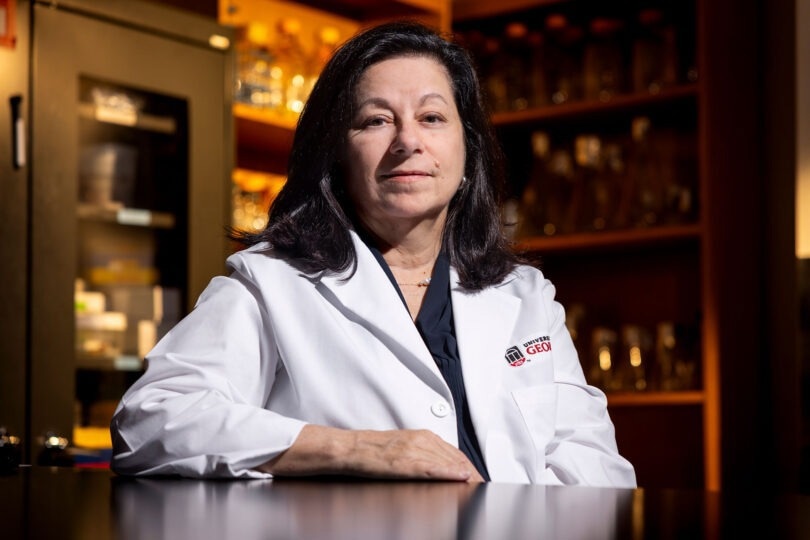Reviewed by Lexie CornerJun 18 2025
A recent study reports that a vaccine developed by researchers at the University of Georgia can both prevent and treat vaginal yeast infections in mice.
 UGA's Karen Norris developed a vaccine that protects against multiple fungal infections. Image Credit: Chamberlain Smith
UGA's Karen Norris developed a vaccine that protects against multiple fungal infections. Image Credit: Chamberlain Smith
This is the latest application of the vaccine. In earlier preclinical studies across four animal models - including nonhuman primates - it provided protection against the three most common fungal pathogens. These three fungi are responsible for over 80 % of life-threatening fungal infections.
The findings support the next step of advancing the vaccine into clinical trials. If proven effective in humans, it could become the first vaccine to protect against pathogenic fungal infections, which the World Health Organization has identified as a significant public health concern.
The thing that is keeping researchers like me up at night is increasing antifungal drug resistance. It is not a prediction. We are living it right now. And we cannot just keep swinging away and trying to make new drugs to fight fungal infections because we are going to lose. These organisms are always adapting to resist new drugs.
Karen Norris, Study Lead Author and Professor, Immunology and Translational Biomedicine, Veterinary Medicine, University of Georgia
The NXT-2 vaccine is designed to prevent fungal infections before they occur, reducing the reliance on antifungal drugs.
First Clinical Trial to Target Yeast Infections; Later Trials to Focus on Life-Threatening Infections
The vaccine will first be tested in women who experience recurring yeast infections, a condition known as recurrent vulvovaginal candidiasis (RVVC).
This condition affects hundreds of millions of women globally and is caused by a type of Candida fungus. In the United States alone, RVVC results in significant healthcare costs each year, including expenses for doctor visits, medication, and lost productivity.
“RVVC is not life-threatening, but it is miserable,” Norris remarked. An estimated 10 % of women may develop the condition at some point, often experiencing three or more infections each year.
“This is a huge need,” Norris stated.
Currently, treatment relies on a single class of antifungal drugs. This raises the risk of drug resistance and reduces treatment effectiveness over time. These medications also cannot be used during pregnancy and do not prevent future infections.
Most individuals affected by recurrent yeast infections are young and generally healthy.
This makes them suitable candidates for Phase 1 clinical research.
The study results may also inform future trials involving higher-risk populations, such as transplant recipients and cancer patients. These groups are especially vulnerable to serious fungal infections, which the vaccine also targets.
Norris stated, “I have had a physician say to me, I have patients that I get through stem cell transplants for their cancer treatment, and then they get aspergillosis. I often do not have adequate treatment for that.”
Pulmonary aspergillosis is a known complication of this treatment. It can result in high mortality, with up to half of affected patients dying from the infection.
Norris added, “That is where I believe this vaccine will do the most good: in people who are at high risk for highly dangerous, life-threatening infections.”
Fungal Infections: A Growing Public Health Threat
Fungal infections are common in people with weakened immune systems.
This includes individuals with uncontrolled HIV or those whose immunity is reduced by treatments such as chemotherapy or anti-inflammatory drugs.
However, research by Norris, postdoctoral researcher Emily Rayens, and José Cordero from the College of Public Health has shown that the at-risk population has expanded in recent years.
The study found that people with diabetes, chronic obstructive pulmonary disease (COPD), or co-infections such as COVID-19, tuberculosis, or influenza are also at higher risk for fungal infections.
Norris noted that as drug resistance increases and infections become harder to treat, prevention becomes more important.
This is the first fungal vaccine to show broad, cross-protective immunity in different animal models. The results suggest potential for future clinical trials.
Source:
Journal reference:
Wychrij, D. A., et al. (2025) Protective efficacy of the pan-fungal vaccine NXT-2 against vulvovaginal candidiasis in a murine model. npj Vaccines. doi.org/10.1038/s41541-025-01171-4.